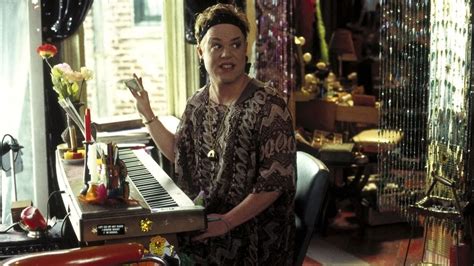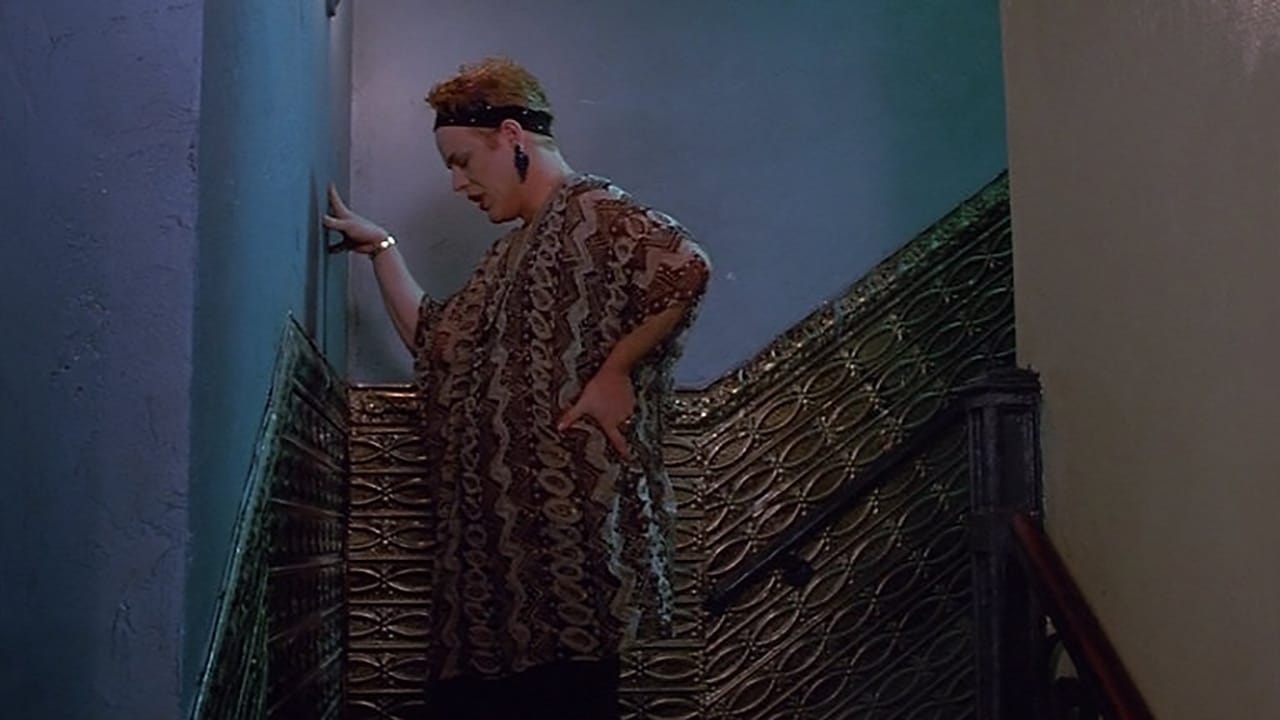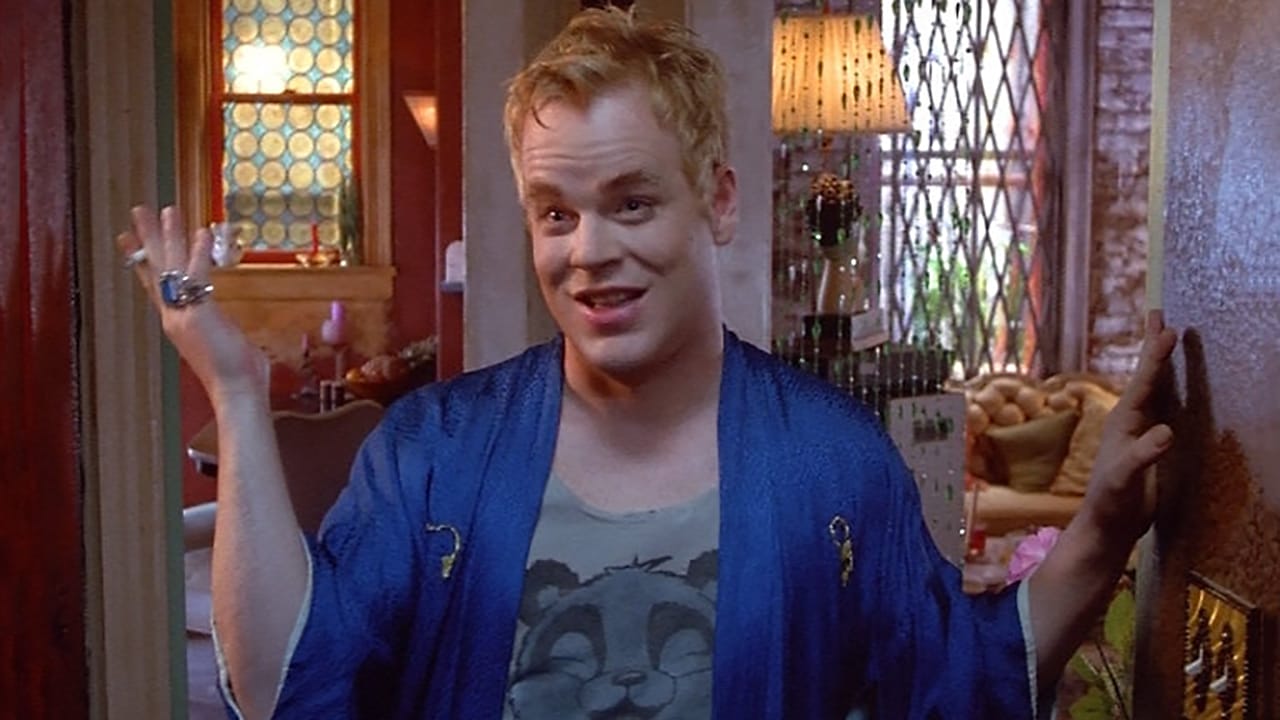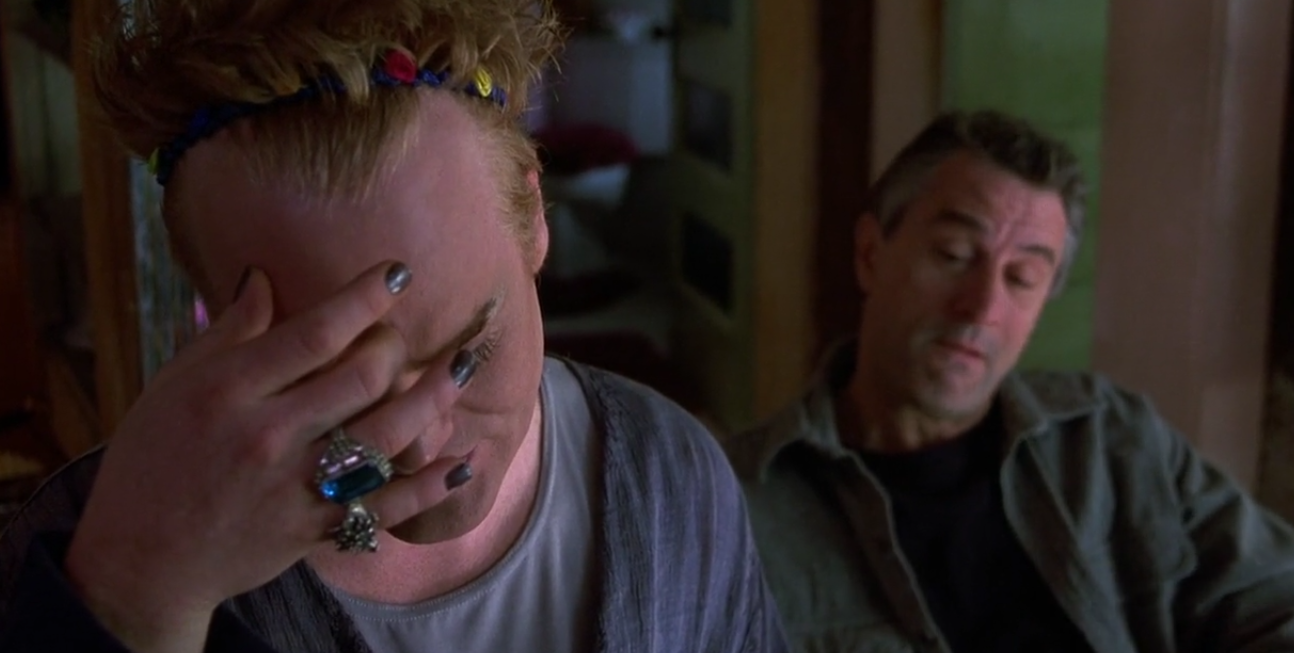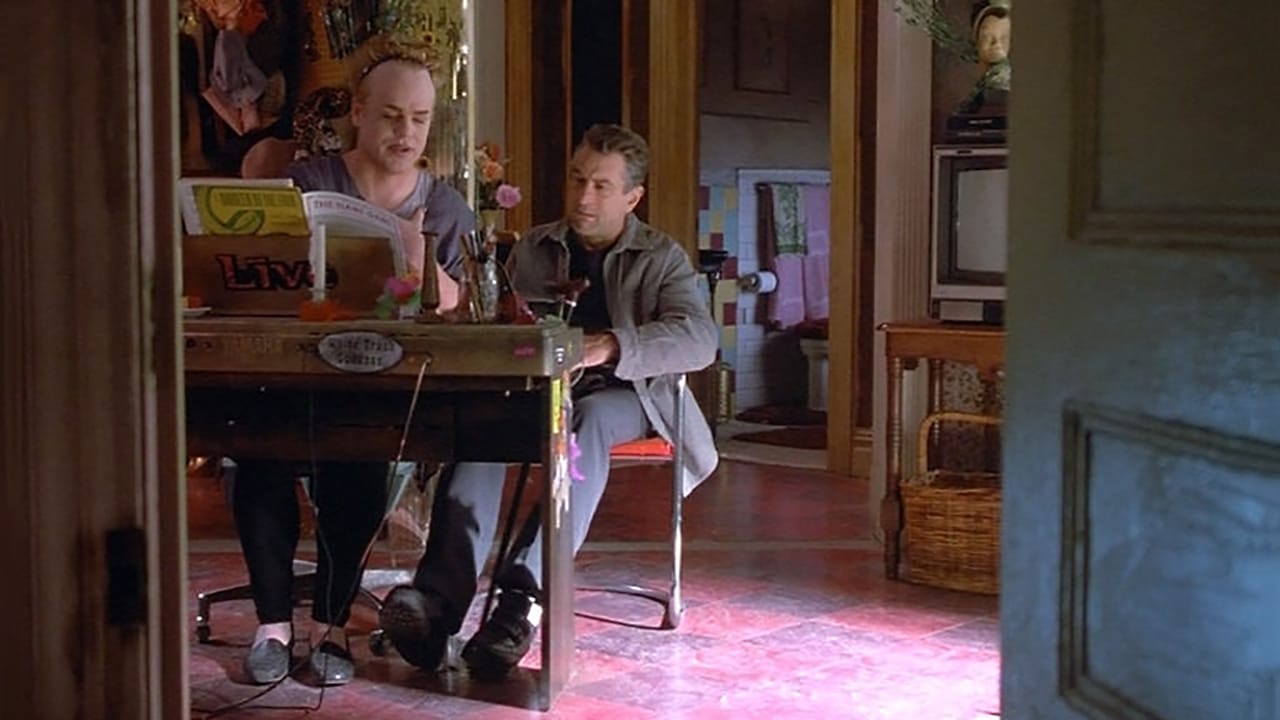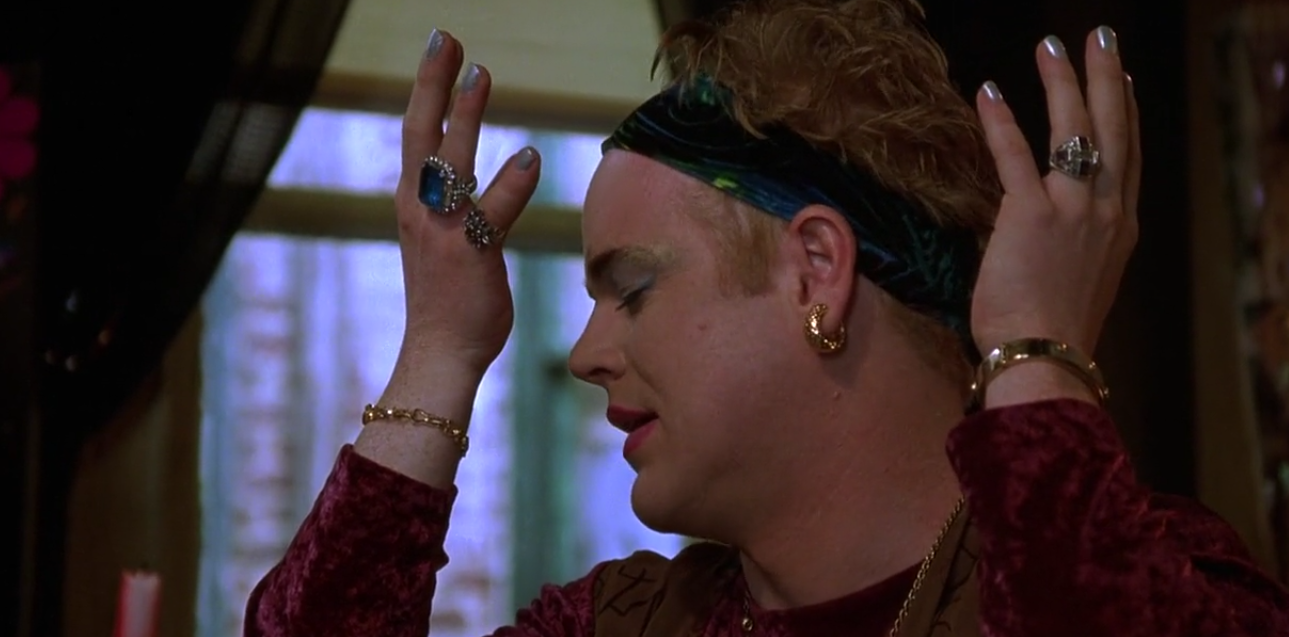Flawless (1999)
written by: Joel Schumacher
starring: Robert De Niro, Philip Seymour Hoffman, Wilson Jermaine Heredia, and Daphne Rubin-Vega
I don't want to give Flawless a hard time, I really don't. I don't want to because I believe this movie, Schumacher's second of 1999 (which feels awfully fast), has good intentions. Though the final execution results in a tonally inconsistent, confusing, messy, pretty bad movie, the idea behind it is as open-hearted and decent as anything Schumacher has made to date. On that level, I don't want to be harsh on it, or mean to it. But... it's hard not to, given how deeply unsuccessful a movie it is. As they say, the road to hell is paved with good intentions.
I think the impulse to make a movie that features gay characters who are unashamed of themselves and are not punished for existing, is a noble one. I think Schumacher's idea of confronting a conservative, shameful bigot with the hatefulness of a world that thinks you're pathetic is decent. I think the kindness and humanism with which he treats his gay and trans characters is wonderful.
But then, for some reason, there's this bizzaro crime plot to darken up the proceedings and add a tawdry tone to everything. It's unnecessary and tends to pop up when you've nearly forgotten it's a thing, as if Schumacher didn't think there was quite enough drama in his initial set up and so needed to sprinkle in some spice. I lay this particularly at his feet in regards to Flawless because he wrote it himself. I have questions as to why, what he was thinking, how he approached the story, what it was at it's conception. Schumacher has said that he only got into writing because he wanted to be a director, and he noticed that writers often were allowed to direct.
So now, in 1999, an established director, why did he return to writing? And what had happened to his writing skills in the meantime?
Because, I'm afraid to say, the script for Flawless is an absolute disaster. Which is a shame, because there are very good performances struggling beneath the burden of the words and story. There's even some interesting technical work, as Schumacher plays with shaky handheld camera movement, lending some scenes a charming visual touch of verisimilitude. The on-the-street aspects of this movie are occasionally charming-- it is in the small, intimate moments that the movie shines. This is, I believe, not surprising for Schumacher. He is always best in tight engagement with his actors, and Flawless is no exception.
And his actors are good! The real star here is Philip Seymour Hoffman (god rest his soul), who at this point was barely a star and barely a known character actor. Yet again, Schumacher plucks up a perfectly good actor just before their career really takes off (there's more of this to come in future his collaborations with Colin Farrell). Flawless is one of PSH's first proper leading roles, and it's real proof of his talent that this clunker of a picture didn't sink him. He stars as Rusty, a trans woman presenting mostly as a gay man, who has one hell of a heart of solid gold. Rusty is struggling financially, living in a roach motel, being treated badly by the world at large-- but she maintains a softness and kindness which lends the movie that surrounds her a similar sense that all is not lost. It's a tender, gentle performance, and Hoffman finds the humanity and sadness in Rusty. Thank god he does, because in many ways Rusty is written as a caricature of being queer, a pose merely, no substance. Early on I had frightful flashbacks of Andrew Garfield gay-gasping his way through Angels in America. But there's more depth and delicacy at play here than most of what Garfield gave me, thank heavens. There is substance there, even within the script, but it comes out so deep into the movie that we are blessed Hoffman managed to infuse some of that humanity into his performance from the get go. Rusty's particular affections come with a reason-- this is not just a straight actor playing at the vague idea of being gay. Not to draw much further comparison, but I found Garfield to be almost unrelentingly false, while Hoffman very often managed to bring truth to Rusty's flippancy and stingers. There is something I quite liked about Hoffman's performance-- his little sibilants, his soft affectations, the anger so often simmering just under the surface. He brought some genuine life to Rusty, real joy and pain, and the performative aspect is deeply ingrained in the character. Not just fake overlay.
Rusty is also deeply unapologetic for who she is and how she presents to the world-- another thing I respect about this movie. Rusty and her friends are respected, if not by the world they live in (certainly not), then by the movie itself. You can feel that Schumacher has deep affection for them, and wants them to live in a world that loves them as much as he loves them, and as much as they love each other. It's almost a trope now, the found families that pockets of non-cisheteros create for themselves, but it's a trope because it's what happens. People find similar souls and cling to them. So it is here, and Rusty's little group of queens is warm, affectionately handled, and never treated as a joke. They're all pretty flamboyant, but I have a hard time holding that kind of character against a writer or a movie. Some people are flamboyant. Some people happily live as what we consider stereotypes. In this case, I think it's fine. So this pocket of friends are mostly of the swishy variety. Makes sense! C'est la vie. Not too mad about it.
And in possibly my favorite scene in the movie, this is addressed! Schumacher writes a scene where Rusty and her friends meet with a coalition of Gay Republicans, buttoned up in perfect business suits. The gay republicans want to discuss the pride parade, and how they can be involved in it, and if maybe everyone else could just tone it down a liiiitle bit. Rusty and her friends listen, respond, listen, respond. They find the republican attitude offensive, but are kind towards them. We are not like you, they say, and we are not sorry about that. “We’re different because you are ashamed of us and we are not ashamed of you," Rusty says gently. She is open-hearted, kind, and would be welcoming to these buttoned-up uptown types if they weren't asking her friends to change themselves. "God bless you," she says, "and fuck off."
That line is amazing. Praise to that line and that scene.
On the other end of the story is Robert De Niro as Walter Koontz, a real piece of shit ex-cop who lives in Rusty's building. He hates his neighbors, ignores them, curses at them, slings slurs at them. Why he lives there, surrounded by drag queens, hookers, and drug addicts, the movie doesn't answer, and it's a question I still sortof have. I think it might be a presentation of deep self-loathing and punishment. That's half of an interesting idea, that Walter has chosen to live in a place he hates as punishment for a mistake he made in his past that he considers irredeemable (another piece of character shading that doesn't emerge until perhaps too late in the movie). Well, if that's the case, I'm not sure Flawless does enough with that idea to justify it. But, in the end, this living choice lands Walter in the same building as Rusty, and therefore our plot begins to churn.
One night, in an explosive bit of violence, a woman in the building is murdered. Her boyfriend stole money from some gangsters, the gangsters kill her attempting to get it back, but fail to recover the money. Here is the deeply flawed crime plot in it's early stages. Walter, hearing violent commotion, goes out to try and be helpful (he may be a bigot but he isn't a totally worthless schmuck), and suffers a debilitating stroke. So for the rest of the movie (the rest of a two hour movie), De Niro is giving a performance as a man who can barely move and barely speak. There's challenge here, and I do think De Niro does a good job of it. He carries so much pain and misery in his eyes, and occasionally I was taken aback by how moved I was by his small, interior performance post-stroke. There's a scene that plays out entirely in close up on his partially frozen face, as he struggles to explain his feelings, or even admit he has feelings at all. It's good stuff, couched in a performance that is overall occasionally, like many performances in this movie, a little much.
In order to help his rehabilitation, Walter's physical therapist suggests he takes singing lessons, saying that might help his speech. Initially reticent, Walter ends up enlisting Rusty's help (as Rusty herself is "a singer and a female impressionist... an artist"), and they begin a tense series of lessons. Thus, our main characters are brought together and forced to interact. Walter is cruel and stubborn. Rusty gives it her best shot, but it's clear that Walter's crummy attitude gets to her. He's nasty, initially, but eventually the two develop something resembling a friendship. Rusty is strikingly kind, even when Walter is brutal to her. But she doesn't merely take abuse either, and slings insults and injury right back at him. This odd-couple kind of sparring could be charming, and occasionally is (the patter through the end credits is divine, if only the rest of the movie had been so lovely!). The voice lesson scenes are some of the most successful in the movie, as you merely watch two talented actors interact. Mostly they're playful, pressing buttons and secretly smiling at the response. Though, of course their burgeoning friendship has it's ups and downs.
The biggest height: Rusty throws Walter a congratulatory party after their sequence of singing lessons is complete. That's a marvelous sequence, crowded and deeply joyous. It's sweet, and Rusty's friends and Walter's friends mingle and enjoy each other. A pretty classic set up of "we're not so different after all." It's cheesy maybe, but it's sweet. The party dies down and leaves Rusty and Walter on a sofa together, framed by Rusty's peeling wallpaper. Then comes the low: Rusty reveals that she has the money that was stolen from the gangsters (did you forget about that? Me too). She intends to use it to get gender-reassignment surgery, and is thrilled to finally have the funds to do it. Walter doesn't like that she hasn't gone to the cops with the money, and is using illicit funds. They fight, they hurl the nastiest insults at each other, and the delicate balance of their relationship is shattered to pieces.
This is where the other shambling plots in this movie come into play, and I haven't mentioned them yet because this movie has about three too many plots. There's Rusty's abusive, married boyfriend, there's a woman Walter was seeing who doesn't care for him now that he can't pay her, there's a background plot about a heroic act Walter was part of ten years before. It's a lot to juggle, and this movie does not juggle them particularly successfully. Most of these things should be treated as background color at most, little vignettes to fill out the world. But there's too much weight given to almost all of them, and it weighs down the simple part of the story we might actually care about.
There's also a whole bit of business with Daphne Rubin Vega, who convinces Walter that he needs people in his life who don't pity him or look down on him, like he looks down on himself now. He's ashamed of his handicapped body, and she teaches him that he needn't be. Heavy-handed, unsubtle stuff. Not always badly presented, but there's an eye-roll quality to some of it that ruins the finer moments. That lesson though gets Walter to go be helpful when the gangsters come looking for their money in Rusty's apartment.
The movie then culminates in a big action sequence, which is abrupt for the story we've been seeing. The way the action plays out isn't particularly smart for how these characters operate either, so it comes across as a little bloated and awkward. The character action happening as Walter and Rusty try to keep the gangsters from killing them isn't bad. It's the physical action and plot contrivances that got us there that are rough. Mostly I felt these characters deserved a more satisfying and cathartic conclusion than what amounts to a fist fight.
If more of the movie had been this grimy sort of genre crime thriller, I could have accepted it more. I even could have applauded it for being a genre movie with gay characters, who's involvement in the story isn't inherently predicated by their being gay. But that's not the case here. Not to say I don't support that Rusty wants surgery, but her her choice to take the money being motivated by this piece of her queer identity maybe undermines the humanistic impulse at play. It diminishes her motivations a little, makes her a queer person who's only goals are in relation to her queerness. I don't know how I feel about that, in the long run. Partially, as a cis-mostly-hetero myself, I maybe don't get to say. I'm not the audience who could have a fully informed opinion on this. And it's also not 1999 any more. I get the feeling that for 1999, this movie was a little progressive. Not immensely progressive, but it tries, and does so with a general sensitivity. It hasn't aged well, perhaps, but not everything does. I don't know about this. I have mixed feelings about it.
So the story is a mess, and the characters are somewhat thinly drawn. Sometimes Schumacher can overcome such things with visual style, solid work with his actors, and interesting framing. There are moments of that in Flawless, like a moment where Rusty's dress matches the wallpaper in the hallway, or the expressionistic, frenetic way Walter's stroke is expressed. Sometimes Schumacher's mastery of light comes to the fore, catching in De Niro's eyelashes. There are long takes that occasionally, at most, pivot around a room, allowing us to luxuriate in the banter of a scene. Then there are the hand-held moments, which are used so minimally as to nearly feel like a mistake. There's some ground-level, almost documentary style filmmaking sprinkled throughout, but it's not enough to register as a choice, or add much to the movie at large. I think the idea is authenticity, but there isn't enough of it for that to register. I prefer the long, steady shots myself. That control is cozy and pleasant, and makes you feel like you're sitting in the room. Sometimes the action happens in the background, or focus remains on the reaction in the foreground. That's pretty cool. For my money, that's more engaging than the shaky wobble. It's easy to forget you're watching a movie when it doesn't cut around too much-- this, too, is the magic of live theatre, occasionally captured on film.
So in the end, I don't know about this one. I don't think it's good, despite a few nice nuggets in there. It feels thematically dissonant, and the tone follows. All at once too crowded and too sparse, too complicated and too simple. Whats the moral here? That the ways in which we're different are the ways in which we're the same? I don't know if I could tell you. On top of that, it doesn't even look very good, or have a sense of flair to speak for it. It just doesn't land properly, despite all the good it's trying to do. And I do, genuinely, think this movie is trying to do good. It has a good heart, and it's characters have good hearts, so I really don't want to trash it.
But heavens this movie is a goddamn mess.
Overall: ★ ★
Schumacherness: ★ ★
Up next: Tigerland (2000)

